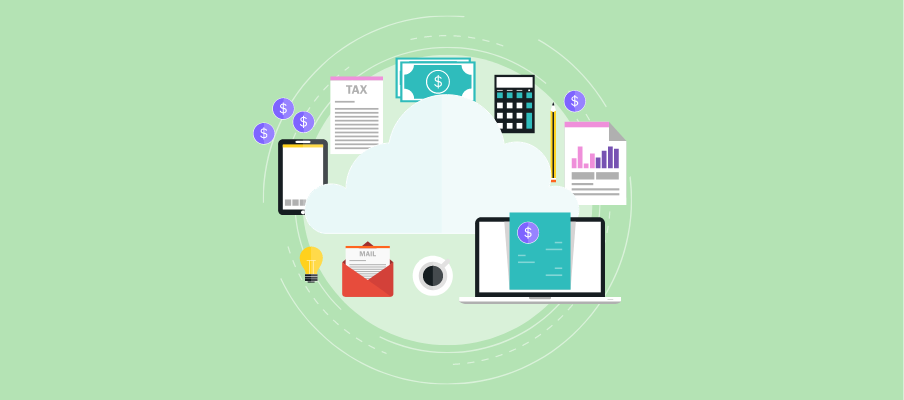Cloud-based software like QuickBooks Online, Xero, or Ziepie Fintech for real-time access to financial data.
What is Virtual Bookkeeping? A Complete Guide

Managing finances is the backbone of any successful business. Whether you're a small business owner, an entrepreneur just starting out, or a CPA advising clients, bookkeeping is a crucial task that ensures financial health. But in today’s digital-first landscape, there's a new contender changing the game—virtual bookkeeping.
This blog will provide an in-depth look at what virtual bookkeeping is, how it compares to traditional methods, why it’s gaining momentum, and how it can help you make your business more efficient. Whether you’ve been considering outsourcing your finances or are simply curious about the benefits of this approach, we’ve got you covered!
What is Virtual Bookkeeping?
Virtual bookkeeping is a modern approach to managing business finances. Unlike traditional bookkeeping, which typically requires an in-house bookkeeper or physical meetings with a professional, virtual bookkeeping is conducted entirely online.
Using cloud-based technology and secure communication tools, virtual bookkeepers can manage your books from anywhere in the world. This means no office space costs, no long-term employee contracts, and unprecedented flexibility for businesses.
But how does virtual bookkeeping differ from its traditional counterpart, and why is it so effective?
Key Differences Between Traditional and Virtual Bookkeeping
As you can see, virtual bookkeeping offers numerous advantages over traditional methods, particularly in terms of accessibility, cost-effectiveness, and flexibility.
Tools and Technologies Driving Virtual Bookkeeping
To be effective, virtual bookkeeping relies on the right mix of technology. Popular tools include:
Document management systems like Google Drive and Dropbox for secure file sharing.
Communication platforms such as Zoom or Microsoft Teams for regular updates and collaboration.
How Does Virtual Bookkeeping Work?
Virtual bookkeeping might sound high-tech, but the process is surprisingly straightforward. Here are the main steps involved:
Initial Setup and Software Integration: The process begins with onboarding. Your virtual bookkeeper will gain access to your accounting software, set up user permissions, and ensure your financial data is accurate.
Data Sharing and Document Management: Using encrypted cloud platforms, you’ll securely share invoices, receipts, and bank statements with your bookkeeper. These tools ensure your documents are stored safely and are accessible only to authorized individuals.
Regular Updates and Financial Reporting: Your bookkeeper keeps your records updated on a daily, weekly, or monthly basis, depending on your needs. They provide financial reports, cash flow statements, and end-of-month reconciliations to keep you aware of your business’s performance.
Role of the Virtual Bookkeeper: A virtual bookkeeper serves as your financial partner. From categorizing expenses to preparing accurate financial statements, they ensure your finances stay in order.
How much does a Virtual Bookkeeper Cost?
The cost of virtual bookkeeping services varies depending on your business’s unique needs and the provider you choose. Typically, providers offer different pricing plans based on factors such as transaction volume, monthly or hourly rates, and level of support required. It is essential to discuss pricing with potential providers and ensure that their services align with your budget and financial goals.
On average, virtual bookkeeping services can range from $200 to $2,500 per month,depending on the complexity of your business's financial needs. For smaller businesses with straightforward transactions, pricing may lean towards the lower end of the spectrum, while larger or more complex businesses, requiring additional services like payroll or tax preparation, may fall on the higher end.
Hourly rates for virtual bookkeepers typically range from $30 to $75 per hour, giving flexibility for businesses that may only need minimal support. Monthly plans often provide more predictable costs and can start as low as $200, scaling up based on the volume of transactions and the depth of services provided. By comparing these options, you can find a solution that fits both your operational requirements and budget.
Advantages of Virtual Bookkeeping
The rise in popularity of virtual bookkeeping can be attributed to the many benefits it offers businesses of all sizes:
Cost-Effectiveness: Virtual bookkeeping often comes at a lower cost compared to hiring an in-house bookkeeper. You save on expenses like office space, equipment, and employee benefits, without compromising on expertise.
Flexibility: With virtual bookkeeping, you gain the ability to access financial support on your schedule. Whether you run a small business or need varying levels of service, virtual bookkeeping adapts to your needs.
Access to Expertise: Virtual bookkeepers are skilled professionals with experience handling diverse financial requirements. They stay updated on the latest accounting software and industry regulations to provide reliable and accurate services.
Time Savings: By entrusting your bookkeeping tasks to a virtual professional, you free up time to focus on growing your business and addressing strategic priorities.
Enhanced Accuracy: Virtual bookkeepers rely on advanced tools and software to ensure precise, up-to-date financial records, minimizing errors and enabling better decision-making.
Data Security: Virtual bookkeeping services often use secure, cloud-based systems to protect your sensitive data and ensure it is accessible anytime you need it.
Challenges of Virtual Bookkeeping
While virtual bookkeeping offers numerous advantages, it does come with its set of challenges.
Lack of Face-to-Face Interaction
One common concern is the lack of face-to-face interaction, which may pose difficulties for business owners who prefer in-person communication to discuss complex financial matters. The absence of direct contact can sometimes lead to misunderstandings or delays in addressing pressing questions.
Reliance on Technology and Connectivity
Another challenge is the reliance on technology and internet connectivity. Virtual bookkeeping services operate through online platforms, so a stable internet connection and familiarity with digital tools are essential. For some individuals or businesses, adapting to this tech-driven process may require additional time and training, which could temporarily disrupt workflow.
Concerns About Data Privacy and Security
Data privacy and security can be a concern for those unfamiliar with cloud-based bookkeeping systems. Although most virtual bookkeeping providers utilize advanced security protocols, such as encryption and regular software updates, some business owners may still feel apprehensive about storing sensitive financial information online. Open communication with your provider about their security measures can help alleviate these concerns.
Who Benefits Most from Virtual Bookkeeping?
Virtual bookkeeping is a fantastic option for various business types, including:
Small and Medium-Sized Businesses that need professional bookkeeping without the expense of a full-time employee.
Startups and Entrepreneurs who require flexibility and scalability as they grow.
Freelancers and Self-Employed Individuals looking to stay organized while focusing on their craft.
Companies with Remote Teams that thrive on cloud-based collaboration.
CPA Firms that want to streamline bookkeeping tasks and focus on higher-value services for their clients.
Tips for Choosing a Virtual Bookkeeping Service
Finding the right virtual bookkeeping partner is key to ensuring your finances are in good hands. Here are some factors to consider:
Experience and Qualifications: Look for professionals with proven track records and certifications such as CPA or QuickBooks ProAdvisor.
Industry Knowledge: Select a bookkeeper with expertise in your specific industry to ensure they understand your business’s unique financial needs.
Customer Support Availability: Ensure the provider offers reliable, accessible customer support for times when immediate questions arise.
Software Compatibility: Check that the bookkeeper is familiar with the accounting software you use or recommend tools if you’re starting from scratch.
Ask the Right Questions: During initial interviews, clarify their workflow, fees, and security measures to see if they’re a good fit for your business.
Verify Credentials and Experience: Look for certifications or formal training that demonstrate their expertise in bookkeeping. Additionally, inquire about their experience in your specific industry to ensure they understand your business's unique challenges.
Prioritize Communication Skills: A good bookkeeper should not only manage numbers effectively but also communicate financial insights in a clear and understandable manner. Strong communication helps ensure you stay informed and confident in your financial decisions.
Frequently Asked Questions
What is a virtual bookkeeper?
A virtual bookkeeper is a professional who manages your financial records, transactions, and reporting remotely using online tools. They provide the same expertise as an in-house bookkeeper but offer flexibility and cost savings through virtual services.
Are virtual bookkeepers in demand?
Yes, virtual bookkeepers are increasingly in demand as more businesses shift to remote operations. Their ability to provide efficient and cost-effective financial management makes them a valuable resource for companies of all sizes.
What is virtual accounting?
Virtual accounting is the practice of managing financial tasks such as bookkeeping, payroll, and tax preparation remotely through digital tools and software. It allows businesses to maintain accurate records and compliance without the need for on-site accountants.




